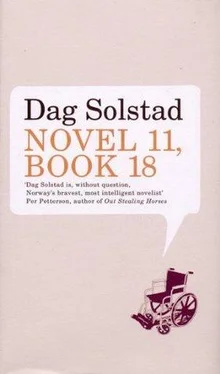This was the way they handled the food. Nothing special or sensational about it, in a situation where a father has a son who is a student living with him. It was natural to do it that way, natural that Bjørn Hansen bought cooked meats, milk, etc., and that he prepared double portions when he made dinner, in case his son had not had dinner when he came home after a long day of lectures and study. Just as natural as his father having breakfast in the kitchen while Peter often ate in his room, so that he could prepare himself for the day’s programme at his leisure, and Bjørn having dinner when he was through with his working day, his son when he was through with his. All of this, in fact, betokened a good, natural relationship between father and son. The contrary would have been unnatural. That the son sat down at his father’s table in spite of the fact that he really ought to have reviewed some lecture notes from yesterday, which he needed today, or that he came home for dinner at five o’clock every day. Then one might start wondering about the son. Or about the father, if he had proposed that they should share the household expenses, including the warmed-up dinners. Still, before long the father thought, ‘Peter eats my food, he’s very welcome.’ Was it because deep down he was offended by Peter never suggesting they should share their household expenses? No, then Bjørn Hansen would have been offended. Was it because Peter took all of this for granted: a free room, free meals, free use of the flat’s common areas? No, for Peter did not take it for granted. On the contrary, there was something about the way in which he acted towards Bjørn Hansen in such situations that hinted at duplicity, a guarded attitude.
On Sundays Bjørn Hansen dined at the Grand Hotel, when he was not at the Busks’. When he came home he noticed that his son had fried a chop or sausages and he thought, I could have invited him to the Grand with me. Originally he had intended to invite Peter to join Herman Busk and himself on their Sunday walks, then they could go to the Grand afterwards, or to Herman Busk’s place. But Herman Busk had already invited him: he had met Peter one day in Bjørn Hansen’s flat. Then he had said that Peter was very welcome as a Sunday dinner guest, along with his father. But Peter had said that it did not suit him. He could not afford to use his Sundays for such things, he was sorry to say. A straight enough answer, in a way — a young man with an appetite for life can surely imagine better ways to spend his Sundays than to have dinner with his ageing father and his ageing friend and his wife. But there was something in Peter’s tone that Bjørn Hansen disliked. It was so boastful. And completely devoid of the least understanding that it was his father’s friend who had invited him, to show that the hospitality he gladly showed towards Bjørn Hansen would now be extended to him as well. Therefore Bjørn Hansen felt Peter’s brusque declaration that he had other uses for his Sundays as a rejection not so much of Herman Busk as of himself, and in the very presence of Herman Busk, his friend, who thus had to witness how Bjørn Hansen’s son refused to assume any filial obligation, despite occupying a room in his father’s house.
It had sounded so unnecessary. Why could he not have given his father that pleasure? To be allowed to take along his own son to Sunday dinner at Berit and Herman Busk’s house, if only once. Or he could have shown himself interested, in principle, thanked Herman Busk politely, and said he would be glad to. He didn’t have to go, after all. He could have found an excuse when the time came. This episode gave Bjørn Hansen a grudge against Peter. ‘He hangs on for dear life,’ he again couldn’t help thinking, without realising in what way precisely this episode had been indicative of it. So when he perceived the smell of chops in the flat when he returned home after his dinner at the Grand, he would think, It serves him right. One day he had an errand at home before dining at the Grand. When he entered the flat, Peter was frying sausages. Sunday afternoon. He was dressed in modern leisurewear, light, loose, thin clothes, the sort young people wear when they are about to have some wholesome fun in their free time, in field and forest. He stood there in these clothes frying sausages. I won’t invite him to come along, no, I won’t, he can stand there with his sausage scraps. He exchanged a few words with his son and said he was going out. He was wearing his old-fashioned anorak, but Peter knew that he was off to a restaurant to have a first-class dinner; when Bjørn said he was going out, Peter knew that he was trying to hide the fact that he was going to dine out, obviously to avoid inviting him along, instead letting him stand there over his four wretched, burnt, smoked-meat sausage halves. Afterwards Bjørn felt regret, of course, as he read the menu at the Grand Hotel.
Because he happened to picture Peter to himself once again. Frying sausages in the kitchen, dressed in his fashionable leisure clothes. Alone. On Sunday. Why doesn’t he find someone to eat out with? he thought. It’s like that every Sunday. The smell of chops hovering in the flat when he came home was a giveaway. And the lone plate in the sink. He’s so much alone, he thought. There wasn’t much that he knew about Peter. He knew him only from what he told him about himself and his doings when he sat down with his father to watch TV in the living room once in a while. Otherwise he saw and heard little of him, in the flat. He came back early every evening of the week. Mostly around six or half-past. If not a little past nine or a little past eleven, a little past nine, a little past eleven, the cinema having just closed; then those couple of hundred metres from Kongsberg’s posh cinema straight home to Bjørn Hansen’s flat. Sometimes Peter would get up from the sofa after watching TV and take a walk. But he never stayed out for long, it was just an evening stroll, or so it appeared.
Why is he not with the others? thought Bjørn. But he is, he protested to himself. On Saturdays. Then he’s out till late at night. He pictured his son to himself then. Spending a long time in the bathroom before he finally comes out in his slovenly but neatly arranged young man’s clothes. Sauntering past his father, sitting on the sofa, with a nonchalant toss of his head as he leaves for the Student Disco, ready to conquer life in Kongsberg on a Saturday evening in the month of October. Mingling with the others and caught up in a hectic youthfulness, until he lets himself into the flat late at night. But what about Sundays? thought Bjørn. Why is he so alone then? Why doesn’t he have dinner with them then? He pictured his son to himself again. How lonely he appeared standing there. How frostily alone in all his stereotypical youthfulness. Perhaps he cannot afford to eat out with them, he thought. My son is very economical. And so he eats at home, by himself. He must have spent time with them earlier in the day. On a ramble with someone or other, and afterwards, when the others go out to do things in style, returning home, because Peter is the only one who has the opportunity to make dinner at home.
For he did, after all, have contact with the others, as Bjørn Hansen could infer from the fact that Peter often mentioned several of his fellow students. As a matter of fact, even Bjørn Hansen knew the names of more than one of them. He had noted their names because Peter had talked so much about them. Karsten Larsen who was from Nybergsund. Jan Feltskog from Skien, who had chatted up the Icelandic girl in their class, so now the two of them were sweethearts and sat at the table in the canteen with their fingers intertwined (Peter said, with a laugh). And the Swede Åke Svensson from Arvika. Not least. Bjørn Hansen had the impression that Peter and Åke, the Swede, were together continually during their study hours; in any case that they sat next to each other in class and stood side by side during the demonstrations of technical equipment at Essilov Aspit’s — the country’s greatest producer of optical aids (Peter had related) where much of their practical instruction took place — besides sitting at the same table as Åke in the canteen when Åke had his dinner (and Peter his coffee with perhaps a Danish), a table where also, Bjørn Hansen strongly suspected, Jan Feltskog and his sweetheart sat intertwining their fingers.
Читать дальше












